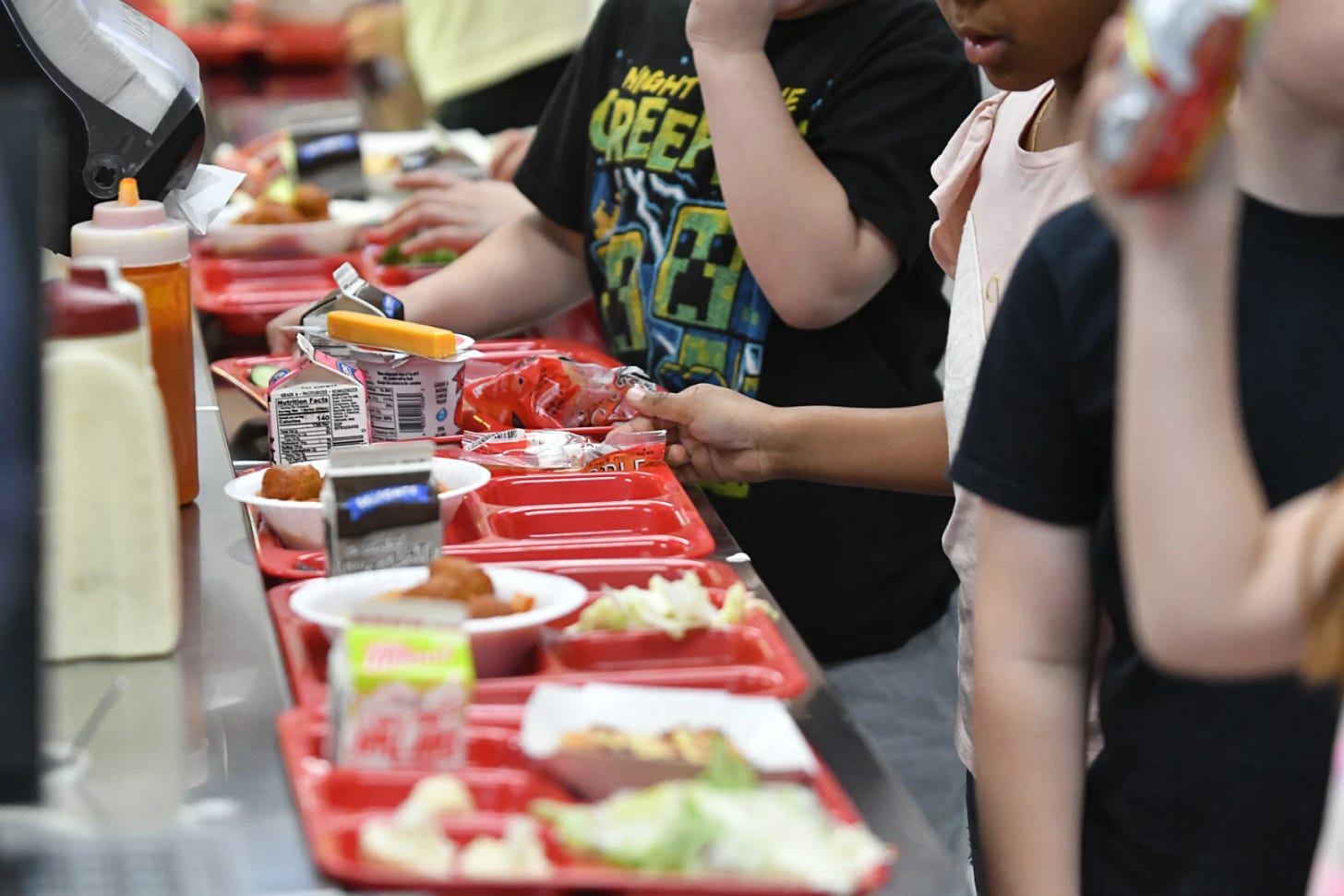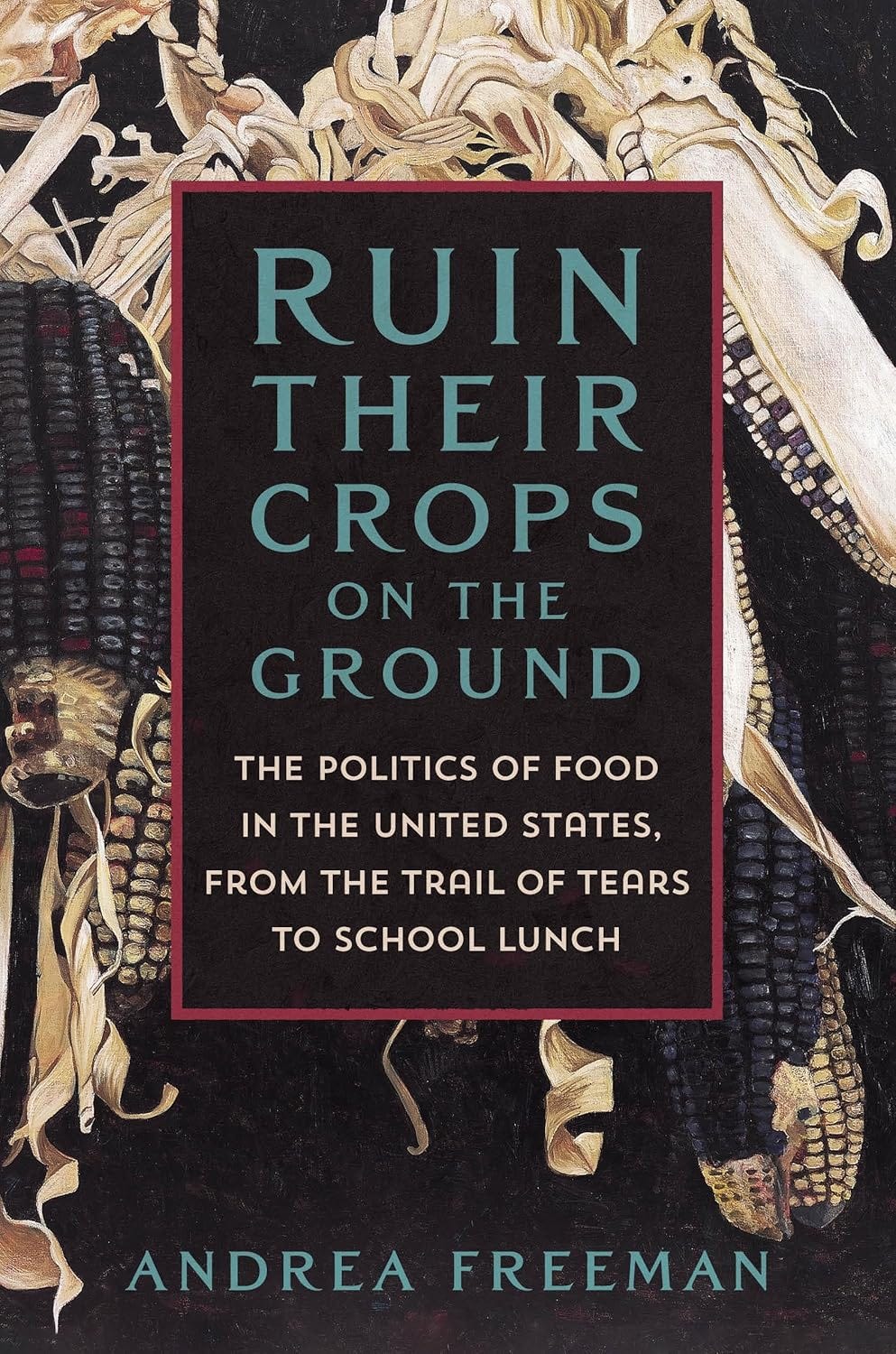Urgent Request! Let's Help Feed Kansas Students
An action alert to eliminate the copay for reduced-price meals in Kansas public schools
We’re zooming in on a local-to-me issue today, with a time-sensitive action alert issued by Kansas Appleseed, an organization advocating for food access and anti-hunger food policy in my home state.
But this is something that impacts your community, too.
Food and nutrition insecurity hits every county in America. The need for free and reduced-price school meals has increased in recent years, and not just in Kansas. More families are struggling to afford basic household expenses, including food at home and meals for school-aged children.
Right now, we can advocate for the elimination of the copay for reduced-price meals in Kansas.
Currently, that copay is 40 cents for lunch and 30 cents for breakfast. Even though you’d be hard-pressed to find a meal for that price outside of a school setting, that can easily add up for families who qualify for the reduced price. This is an added burden for food-insecure households, and is becoming a looming issue for families who don’t meet the financial qualifications for free meals.
Feeding America has one of the best tools to view the rates of food insecurity across the United States. Use their “Mind the Meal Gap” interactive map to view by state or county. Food insecurity among Kansans rose from 11.7% to 13.5% in just two years (between 2020 and 2022, according to the most recently available data).
Here in Kansas, the statewide estimate for student meal debt was $23.5 million dollars in 2022. However, policymakers are reluctant to go hard on any actions that could bring relief. Late last year, the Kansas State Board of Education voted against including universal free school meals as a legislative priority. Some states, including Maine, Massachusetts, Minnesota, and New Mexico, have already passed legislation to fund universal free school meals (either permanently or for the 2024-2025 school year).
Our governor, Laura Kelly, just released a proposed state budget for FY 2026 that included $5.5 million for free meals for approximately 36,000 students across the state who currently get them for the reduced price. I’m a fan of this, as $5.5 million to feed kids in school feels like a drop in the bucket. However, those who lean “fiscally conservative” might disagree.
Kansas Appleseed will be formally speaking on this issue next week on Wednesday, January 29. They’re testifying before the House Committee on K-12 Education Budget, and will be including submitted testimony from Kansans.
So here’s where you can take action!
Add your voice and help support these efforts to eliminate the copay for reduced-price school meals in Kansas.
To submit: email your testimony to Paige Olson at polson@kansasappleseed.org by NOON on Tuesday, January 28, and it will be forwarded to the committee.
Here’s a sample template, provided by Kansas Appleseed. My testimony is featured in bold, so if you plan on using this template for yourself, be sure to replace those sections with your own words.
Testimony of [Insert Name], [Town, Kansas]
In Support of Funding Reduced-Price Copays
Chairman Goetz and Members of the House Committee on K-12 Education Budget:
[Introduction and connection to the issue] Thank you for the opportunity to provide testimony in support of funding the reduced-price copay in the budget. I want to share my personal experience with the issue of school meals and why I strongly support including funding reduced-price copays in the state's budget.
[Make your statement as personal as possible, indicating how it affects you and your life. Explain why the issue pertains and matters to you. 1-2 paragraphs] As a registered dietitian with a decade of experience, I know the importance of balanced nutrition for health and chronic disease prevention. This is especially important for school-aged children, who have unique nutrition needs during periods of growth and development. School meals should not only provide nourishing foods for breakfast or lunch, but be a positive experience for students to engage and socialize with their peers outside of the classroom. A 2021 review found that free school meals were associated with increased participation1, a critical metric for public schools to fund their kitchen operations. Additionally, research shows that when children have consistent access to nutritious food, they perform better academically, have improved concentration, and improved diet quality. There are also fewer behavioral issues and bullying incidents reported by teachers and school staff.
Eliminating the copay for reduced-price school breakfast and lunch is a crucial step towards ensuring that all students, particularly those from low-income households, can receive the balanced, nutritious meal they deserve without the barrier of additional costs. The proposed line item in the FY 2026 budget is not just about food — it’s about equity. No student should have to face the stigma of being unable to afford a full meal, and no parent or caregiver should have to choose between buying a meal and other basic needs.
[Wrap up, reiterate your stance on the issue] I urge you to consider the needs of all families in the state of Kansas, and invest in the well-being and potential of every single child. Please make it a priority so our schools can foster a healthier, better nourished, and more equitable future.
Thank you for allowing me to support this proposal today.
[Signature]
It only takes a few minutes to draft your testimony and copy/paste it into an email. I know it can seem hard to find meaningful ways to contribute to causes you care about, but this one is low stakes/high reward. I hope you’ll join me!
If you’re not in Kansas, thanks for reading this far to learn more about a local issue. But don’t stop here — more than likely, there’s a similar need for advocacy and action in your state.
Another easy and very direct way to take action: contact a local public school to pay off part or all of the overdue balance for a student.
If you’re interested in learning more about school lunch, I recommend checking out “Ruin Their Crops In The Ground: The Politics of Food in the United States, From the Trail of Tears to School Lunch” by Andrea Freeman.
Though this isn’t the only book on this topic, it happens to be the one I’m currently reading. Chapter 5 focuses specifically on school lunch programs, with interviews and insights from students, cafeteria staff, school faculty members, and parents.
For me, the reporting was challenging to hear because I know many of my dietitian colleagues that work in school nutrition are enthusiastically and wholly committed to providing delicious meals for the students in their districts. I don’t want to criticize their efforts because it’s challenging work that often goes unappreciated. Yet, at the same time, there are significant funding gaps and policies (from the federal level down to the school boards) that make this extremely difficult job even harder.
You’ll hear about the stigma of free and reduced-price meals firsthand, with students recounting the embarrassment and shame associated with school meals, and the de facto segregation in schools and cafeterias that worsens the divide between students who can afford to pay and those who can’t.
I’m not a parent myself, so my ability to fully relate to these struggles is limited by that. But I think it’s an important issue for everyone whether you have children or not, or whether your children attend public schools or not.
Why?
Because you can’t learn if you’re hungry, and no child should have to go hungry.
We can feed everyone, so we need to ensure policymakers understand they play a critical role in making that a reality.
Cohen, J. F. W., Hecht, A. A., McLoughlin, G. M., Turner, L., & Schwartz, M. B. (2021). Universal School Meals and Associations with Student Participation, Attendance, Academic Performance, Diet Quality, Food Security, and Body Mass Index: A Systematic Review. Nutrients, 13(3), 911. https://doi.org/10.3390/nu13030911







